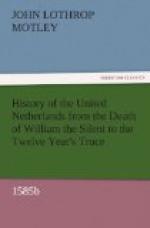Between Kalloo and Ordam, upon the opposite side, a sandbar had been discovered in the river’s bed, which diminished the depth of the stream, and rendered the pile-driving comparatively easy. The breadth of the Scheldt at this passage was twenty-four hundred feet; its depth, sixty feet. Upon the Flemish side, near Kalloo, a strong fort was erected, called Saint Mary, in honour of the blessed Virgin, to whom the whole siege of Antwerp had been dedicated from the beginning. On the opposite bank was a similar fort, flamed Philip, for the King. From each of these two points, thus fortified, a framework of heavy timber, supported upon huge piles, had been carried so far into the stream on either side that the distance between the ends had at last been reduced to thirteen hundred feet. The breadth of the roadway—formed of strong sleepers firmly bound together—was twelve feet, along which block-houses of great thickness were placed to defend the whole against assault.
Thus far the work had been comparatively easy. To bridge the remaining open portion of the river, however, where its current was deepest and strongest, and where the action of tide, tempest, and icebergs, would be most formidable, seemed a desperate undertaking; for as the enterprise advanced, this narrow open space became the scene of daily amphibious encounters between the soldiers and sailors of Parma and the forces of the States. Unfortunately for the patriots, it was only skirmishing. Had a strong, concerted attack, in large force, from Holland and Zeeland below and from the city above, been agreed upon, there was hardly a period, until very late in the winter, when it might not have had the best chances of success. With a vigorous commander against him, Parma, weak in men, and at his wits’ end for money, might, in a few hours, have seen the labour of several months hopelessly annihilated. On the other hand, the Prince was ably seconded by his lieutenant, Marquis Richebourg, to whom had been delegated the immediate superintendence of the bridge-building in its minutest details. He was never idle. Audacious, indefatigable, ubiquitous, he at least atoned by energy and brilliant courage for his famous treason of the preceding year, while his striking and now rapidly approaching doom upon the very scene of his present labours, made him appear to have been building a magnificent though fleeting monument to his own memory.
Sainte Aldegonde, shut up in Antwerp, and hampered by dissension within and obstinate jealousy without the walls, did all in his power to frustrate the enemy’s enterprise and animate the patriots. Through the whole of the autumn and early winter, he had urged the States of Holland and Zeeland to make use of the long winter nights, when moonless and stormy, to attempt the destruction of Parma’s undertaking, but the fatal influences already indicated were more efficient against Antwerp than even the genius of Farnese; and




